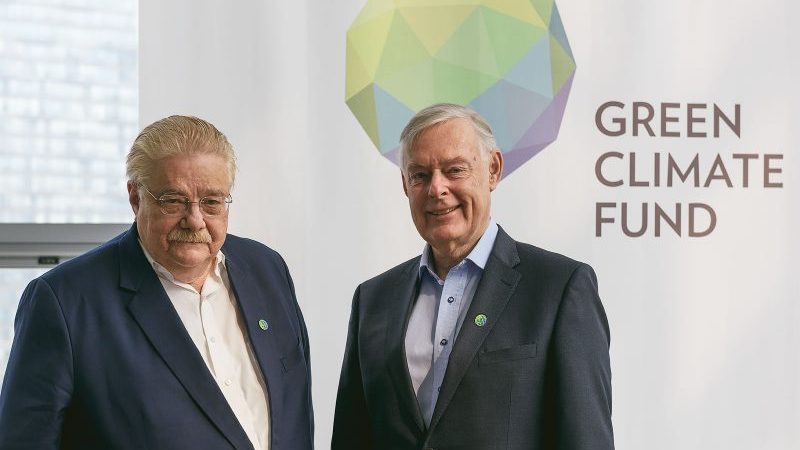The first Green Climate Fund (GCF) Board meeting of 2018 concluded on Thursday, February 1, after approving 23 projects, valued together at $1,093.5 million of GCF funding.

The new approvals bring the GCF portfolio to a total of 76 projects and programmes, amounting to $3,730.2 million in GCF funding to assist developing countries in their low emission and climate resilient development.
The Board elected Ambassador Lennart Båge and Dr. Paul Oquist as its Co-Chairs for 2018, representing developed and developing countries respectively. A number of significant policy decisions were also made to strengthen GCF’s operations, including adopting an Indigenous Peoples Policy, and an Environmental and Social Policy.
In addition to the funding approvals, the Board approved an additional $60 million for the implementation of the Readiness Programme to assist developing countries in accessing GCF funds.
“We have had a highly positive week, approving over $1 billion in projects, which is a record amount in a single GCF Board meeting,” stated Paul Oquist, GCF Co-Chair.
“This large volume of projects for both mitigation and adaptation – and the additional $60 million for readiness support – shows that GCF is ready to shift gear in supporting developing countries to achieve their climate goals. The projects adopted here will make a real impact in the face of climate challenges,” he continued.
Fellow Co-Chair, Lennart Båge, stated: ‘The Board has successfully managed an ambitious agenda this week, demonstrating its commitment to deliver a serious contribution to the response to climate change. In particular, the adoption of an Indigenous Peoples Policy and an Environmental and Social Policy is an important step towards completing GCF’s policy framework.”
Båge concluded, “Paul and I would also like to thank our fellow Board members for their positive support, and to acknowledge that our work builds on the achievements of our predecessors as Co-Chairs, Ayman Shasly and Ewen McDonald.”
The 19th GCF Board meeting approved the following projects and programmes, including the first project submitted under the new Simplified Approval Process:
- $42.16 million for the Climate-Resilient Water Sector in Grenada (G-CREWS) with Deutsche Gesellschaft für Internationale Zusammenarbeit (GIZ) GmbH
- $27.61 million for the Water Sector Resilience Nexus for Sustainability in Barbados (WSRN S-Barbados) with Caribbean Community Climate Change Center (CCCCC)
- $20 million for the Integrated physical adaptation and community resilience through an enhanced direct access pilot in the public, private, and civil society sectors of three Eastern Caribbean small island developing states in Antigua and Barbuda, Dominica, and Grenada, with the Department of Environment, Ministry of Health and Environment, Government of Antigua and Barbuda (DOE ATG)
- $25.06 million for the Poverty, Reforestation, Energy and Climate Change Project (PROEZA) in Paraguay with the Food and Agriculture Organisation of the United Nations (FAO)
- $23 million for Promoting private sector investments in energy efficiency in the industrial sector in Paraguay with the Inter-American Development Bank (IDB)
- $103 million for Promoting risk mitigation instruments and finance for renewable energy and energy efficiency investments in Argentina with the Inter-American Development Bank (IDB)
- $195 million for Financial Instruments for Brazil Energy Efficient Cities (FinBRAZEEC) in Brazil with the World Bank
- $25 million for the Pacific Resilience Project Phase II for RMI in the Marshall Islands with the World Bank
- $9.27 million for Building climate resilience of vulnerable and food insecure communities through capacity strengthening and livelihood diversification in mountainous regions of Tajikistan with the World Food Programme
- $27.05 million for Scaling-up Multi-Hazard Early Warning System and the Use of Climate Information in Georgia with UNDP
- $24.98 million for Enhancing adaptive capacities of coastal communities, especially women, to cope with climate change induced salinity in Bangladesh with UNDP
- $20 million for the Global Clean Cooking Programme – Bangladesh with the World Bank
- $86.30 million for Scaling Up Energy Efficiency for Industrial Enterprises in Vietnam with the World Bank
- $32 million for Strengthening climate resilience of agricultural livelihoods in Agro-Ecological Regions I and II in Zambia with UNDP
- $32.79 million for Strengthening climate resilience of rural communities in Northern Rwanda with the Ministry of Environment of Rwanda (MOE)
- $22.50 million for the Africa Hydromet Program – Strengthening Climate Resilience in Sub-Saharan Africa: Burkina Faso Country Project with the World Bank
- $5 million for the Institutional Development of the State Agency for Hydrometeorology of Tajikistan with the Asian Development Bank (ADB)
- $40 million for Climate-Friendly Agribusiness Value Chains Sector Project in Cambodia with the Asian Development Bank (ADB)
- $145 million for the Ulaanbaatar Green Affordable Housing and Resilient Urban Renewal Project (AHURP) in Mongolia with the Asian Development Bank (ADB)
- $26 million for the Acumen Resilient Agriculture Fund (ARAF) in Ghana, Nigeria, Uganda, with the Acumen Fund Inc
- $52.50 million for the Zambia Renewable Energy Financing Framework with the African Development Bank (AfDB)
- $100 million for the Line of Credit for Solar rooftop segment for Commercial, Industrial and Residential Housing sectors in India with the National Bank for Agriculture and Rural Development (NABARD)
- $9.30 million for Improving rangeland and ecosystem management practices of smallholder farmers under conditions of climate change in Sesfontein, Fransfontein, and Warmquelle areas of the Republic of Namibia with the Environmental Investment Fund (EIF).
More than 350 participants took part in the 19th Board meeting, including observers from civil society and private sector organisations, National Designated Authorities (NDAs), Accredited Entities, and GCF Delivery Partners.
